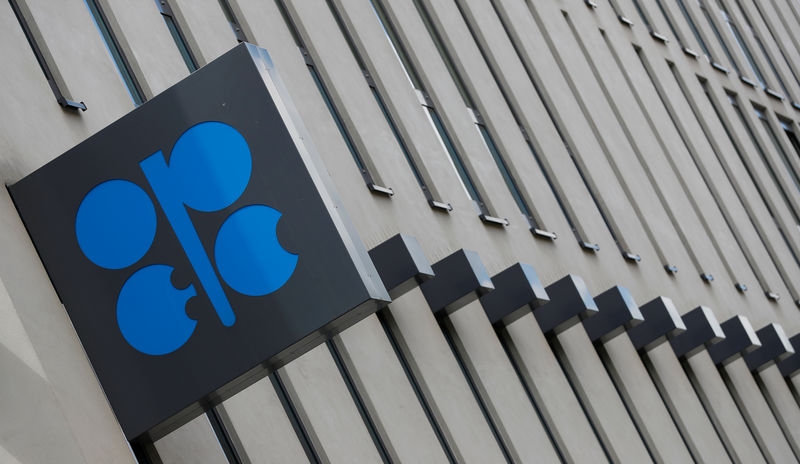 © Reuters. FILE PHOTO: The OPEC logo is seen at OPEC’s headquarters in Vienna
© Reuters. FILE PHOTO: The OPEC logo is seen at OPEC’s headquarters in ViennaBy Alex Lawler and Rania El Gamal
LONDON/RIYADH (Reuters) – OPEC and non-OPEC oil producers, which agreed to relax supply curbs in June, may need to change course because of rising inventories and economic uncertainties, according to a ministerial panel’s findings released on Thursday.
The statement might further complicate relations between the Organization of the Petroleum Exporting Countries and the United States, whose President Donald Trump has repeatedly lashed out at the organization saying it is not supplying enough oil.
, the global benchmark, has lost about $10 a barrel since hitting a four-year high of $86.74 on Oct. 3, on signs of ample supply even as U.S. sanctions on Iran aimed at cutting the OPEC member’s oil exports loom.
An OPEC and non-OPEC panel called the Joint Ministerial Monitoring Committee reviewed a technical report, which found countries increased output in September by complying with 111 percent of pledged supply curbs, the statement issued by OPEC said.
Adherence was 129 percent in August.
“The committee expressed overall satisfaction with the collective performance of member countries in the month of September,” the statement said.
“The committee, however, expressed concerns about rising inventories in recent weeks and also noted looming macroeconomic uncertainties which may require changing course.”
OPEC and its allies hold their next policy meeting in December.
Forecasters, including the International Energy Agency, expect slower growth in global oil demand next year and rising supplies from outside OPEC, which could further increase inventories if OPEC keeps output at the same level.
Earlier on Thursday, top exporter Saudi Arabia said the oil market could be oversupplied in the fourth quarter of the year as stocks rise and demand slows. It said it will “mirror” such changes in its production.
“We are of the view that the market in the fourth quarter could be shifting towards an oversupply situation as evidenced by rising inventories over the past few weeks,” Saudi OPEC governor Adeeb Al-Aama told Reuters.
The OPEC governor is typically one of the most senior posts in a country’s OPEC delegation after the energy minister.
Fusion Media or anyone involved with Fusion Media will not accept any liability for loss or damage as a result of reliance on the information including data, quotes, charts and buy/sell signals contained within this website. Please be fully informed regarding the risks and costs associated with trading the financial markets, it is one of the riskiest investment forms possible.
Source: Investing.com




























